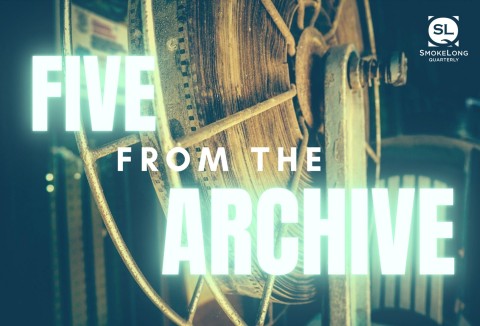
The following is part of the SmokeLong Quarterly Five from the Archive series. This series is meant to be a resource mainly for creative writing instructors in search of flash narratives on a certain topic or dealing with a particular narrative device. Check out the entire series HERE.
________________________
Compiled by Christopher Allen
It is a delicate and often complex issue: using the lyrics of copyright songs in stories. As a rule, you shouldn’t do this. If you’re dead set on using song lyrics in your narrative, get permission. Song titles are another story: titles aren’t protected by copyright, so feel free to use them. Alluding to song is an effective way of creating mood, like laying down a soundtrack to the story. You can also build character with song as we are all what we listen to, aren’t we? With these thoughts in mind, let’s have a look at how a few SmokeLong narratives have used songs to create an affecting, compelling story.
 1. “He Ain’t Heavy” by Janelle Bassett
1. “He Ain’t Heavy” by Janelle Bassett
The narrator in Janelle Bassett’s has a famous sibling…a song. Bassett manages to tell a family’s history through the vehicle of real and imagined folk songs, through a song entitled “Put Your Weapons Down for Lazy Hour,” a song that exists only in Bassett’s limitless imagination. By merely comparing this song to a real song in the story Bassett cleverly sidesteps the problem of copyright infringement. Incidentally, you should notice that the title of Bassett’s story suggests a popular song title itself—the ‘He’ in the title referring to the narrator’s sibling, the song.
Writing Task: Incorporate an imaginary song into a narrative about a character coming of age or a character looking back at a moment particularly important in their family history.
 2. “I’m Such a Slut and I don’t Give a Fuck” by Jen Michalski
2. “I’m Such a Slut and I don’t Give a Fuck” by Jen Michalski
In much the same way the Janelle Bassett creates an imaginary song for her story, Jen Michalski also imagines a song for her story of the same name. Michalski’s title is provocative and a bit of a bait-and-switch technique that pays off here. The story is about an apparently washed-up singer/songwriter, a story about how we can’t go back, how we have to keep reinventing ourselves, how no matter what other people expect of us we have to like who we become.
Writing Task: Write a story about expectations: your main character’s own expectations contrasted to what other characters expect of them.

3. “By Saturday, We’d be Singing” by John Riley
Riley uses the songs of Sam Cooke as the fire in this story. The narrative builds to this intense moment near the end when all of Riley’s character building pays off. This is a great example of how to incorporate song as narrative device: as soundtrack and plot point together. Riley’s moment is beautiful.
Writing Task: Draft a narrative in which the heart of the narrative is the characters listening to a song together. Extra points for avoiding sentimentality. Remember that this experience does not have to be pleasing or happy.
 4. “This Charming Man” by Thomas Hobohm
4. “This Charming Man” by Thomas Hobohm
The original title of this story used lyrics from The Smiths’ song “This Charming Man”. While we couldn’t use the lyrics, we could use the title. As I’ve stated above, titles are not protected by copyright. Hobohm’s story explores a complex relationship and break-up and is illuminated by the LYRICS to The Smiths’ song. Can you guess what the original title was?
Writing Task: Choose a song you love, one that moves you, and write a flash narrative based on how it makes you feel or how it makes your characters feel. Go ahead and use the title of the song as the story’s provisional title.

5. “Unlimited Options” by Jason Sprinkle
Sprinkle uses the allusion to a song and the import of the chorus to effect a mood near the end of this micro, leaving readers with the song playing in their heads—that is if the readers know the song. A risk.
Writing Task: By alluding to a song, layer an existing WIP with a particular mood.
More SmokeLong narratives incorporating songs or the concept of song:
“Free Fallin'” by Glenn Orgias (forthcoming in Issue 81)
“The Sound and the Song” by Letitia Trent
“Human Song” by Shannon McLeod

 The core workshop of SmokeLong Fitness is all in writing, so you can take part from anywhere at anytime. We are excited about creating a supportive, consistent and structured environment for flash writers to work on their craft in a community. We are thrilled and proud to say that our workshop participants have won, placed, or been listed in every major flash competition. Community works.
The core workshop of SmokeLong Fitness is all in writing, so you can take part from anywhere at anytime. We are excited about creating a supportive, consistent and structured environment for flash writers to work on their craft in a community. We are thrilled and proud to say that our workshop participants have won, placed, or been listed in every major flash competition. Community works.